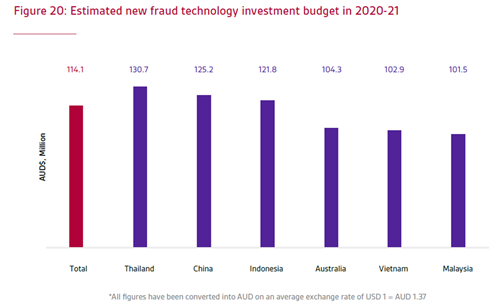
Australian FIs to spend AUD104 million on average on fraud prevention technology, less than FIs in Thailand, Indonesia and China – GBG research
SYDNEY, AUSTRALIA, September 2020 – GBG (AIM:GBG), the global technology specialist in fraud and compliance management, identity verification and location data intelligence, has today launched its inaugural report for Australia, titled "Future-proofing Fraud Prevention in Digital Channels: Australia FI Study", which analyses the impact of fraud on financial institutions (FIs) across six countries and the technologies they are planning to invest in to mitigate today's fraud threats and scale to address emerging fraud patterns.
The report found FIs in Australia have an average estimated budget of AUD104.3 million to purchase new fraud prevention technology in 2020-2021. The average across APAC was AUD114.1 million, with the highest average estimated fraud budgets being in Thailand at AUD130.7 million, China at AUD125.2 million and Indonesia at AUD121.8 million.

Source: Future-proofing Fraud Prevention in Digital Channels: Australia FI Study, GBG and The Asian Banker, June 2020
The report analysed a survey of 324 respondents from financial institutions in six key Asia-Pacific markets including Australia, China, Indonesia, Malaysia, Thailand and Vietnam. Conducted by The Asian Banker, the research aims to unveil emerging and future fraud trends among financial institutions, particularly as ways of living, working and transacting become more digital during the COVID-19 pandemic.
The report highlights the following key findings about Australian financial institutions:
- Mobile financial services to help customers transact instantly are seeing greater demand and rollout. This includes peer-to-peer (P2P) payments and transfers via mobile number, and e-wallet and mobile wallet services. However, Australian FIs are slow to adopt next-gen digital offerings such as fraud alerts (21%) and voice-activated fund transfers (15%).
- Millennials and GenZ will be key target segments for unique digital offerings for 33% of FIs in 2020-21.
- Australian FIs are prioritising spend on compliance technology as a means of strengthening customer trust and appeasing increasingly vigilant regulators. More than a third (36%) of FIs see compliance management as a key challenge, and 42% said managing the increasing costs of compliance is the biggest challenge inhibiting the introduction of new digital offerings.
- End-to-end fraud management platform readiness is a key differentiation to driving digital product preference for 70% of Australian FIs. While only 20% have an existing implementation of an integrated end to end fraud and compliance platform solution, this is relatively higher than the 6% average of APAC FIs.
- While the unification of data across cyber, fraud, and compliance functions can help negate repeat fraud attacks, 58% of respondents indicated their cyber security, fraud control and compliance functions are completely independent functions with no sharing of insights. This lack of alignment is much higher than APAC, where only 43% of respondents indicated the three functions are still operating in silos.
- Social engineering attacks led by scams (44%) and stolen-IDs (40%) will dominate fraud prevention priorities of Australian FIs in 2020-21.
- Fraud technology readiness of Australian FIs is lower compared to APAC with significantly lower penetration of fraud management and endpoint threat systems.
Carol Chris, Regional General Manager Australia at GBG, commented, “The ongoing shift to online and mobile banking and transactions, particularly among superannuation, financial planning and education enterprises, has been accelerated by the pandemic. The unpredictability of the current market and how it is evolving is driving a need among Australian FIs to increase readiness to be agile in how they future-proof themselves with fraud technology. The groundswell in online service delivery and use, combined with the ability to make instant payments over the NPP and the rise in fintechs, makes the opportunities for fraudsters and financial criminals more abundant and hazardous than ever, pushing FIs to ensure they have truly pre-emptive and end to end fraud management technology platforms in place for 2020 and onwards.”
Financial Crimes 4.0, a term coined by GBG, is a risk trend covering the heightened complexity and growing volume of emerging financial crime patterns arising from the state of hyperconnectivity in today’s Industry 4.0. This includes the boom in digitally connected devices and data driving demand for immediate transactions.
Chee Leong Chin, APAC Chief Technology Officer of GBG, added, "The proliferation of personally identifiable information (PII) is making consumers increasingly vulnerable and susceptible to fraud and identity crimes. Meanwhile, customer expectations around instant access to an increased variety of digital financial services and digital safety assurance in transacting online are also skyrocketing. GBG continues to innovate and be ahead of market needs with its tech stack ranging from end to end fraud platforms, to pre-emptive fraud detection like machine learning and data intelligence from best in class players across identity proofing, mobile and IP assessment, cyber threats, credit risk and location intelligence."
For more insights into the research, download our report: “Future-proofing Fraud Prevention for Digital Channels: APAC FI Study”
To access the series of Future-proofing Fraud Prevention in Digital Channels reports, visit:
- Indonesia Financial Institution Study
- Malaysia Financial Institution Study
- Australia Financial Institution Study
- APAC Financial Institution Study
To find out more about how we help our clients establish trust with their customers, visit www.gbgplc.com/apac, follow us on Twitter or LinkedIn.
- Technology
- Insight